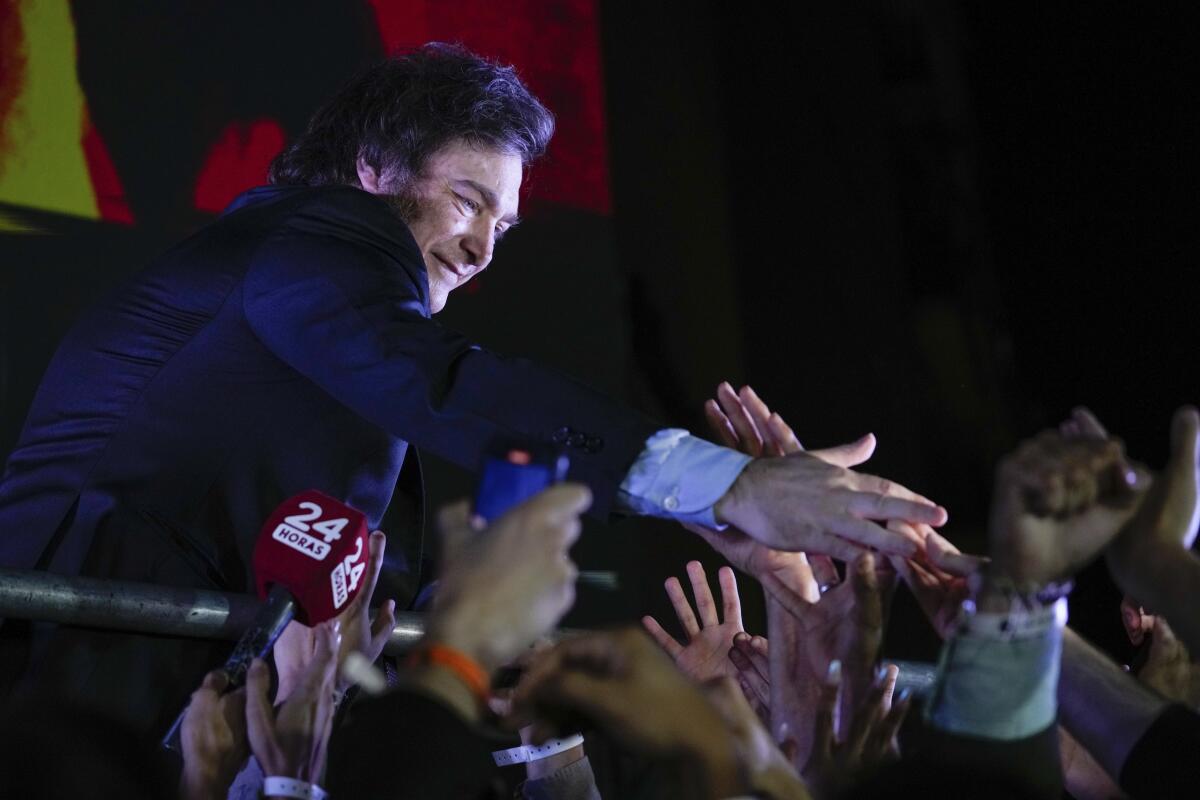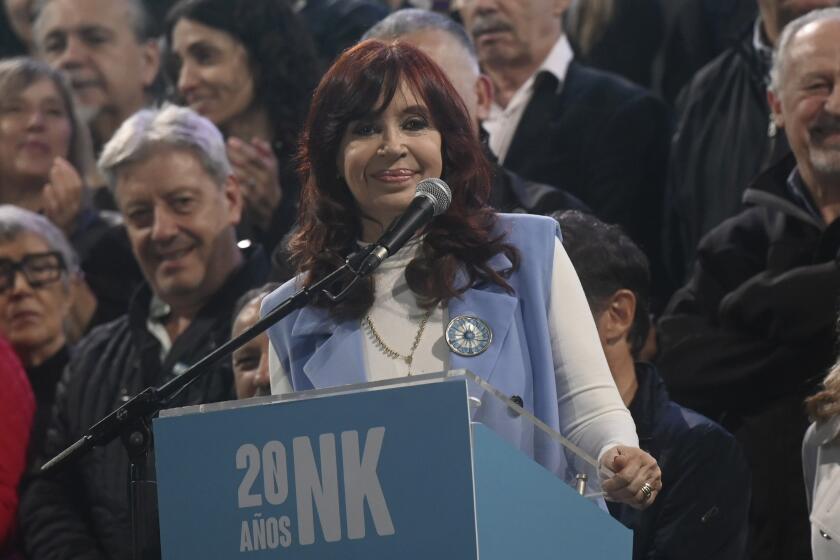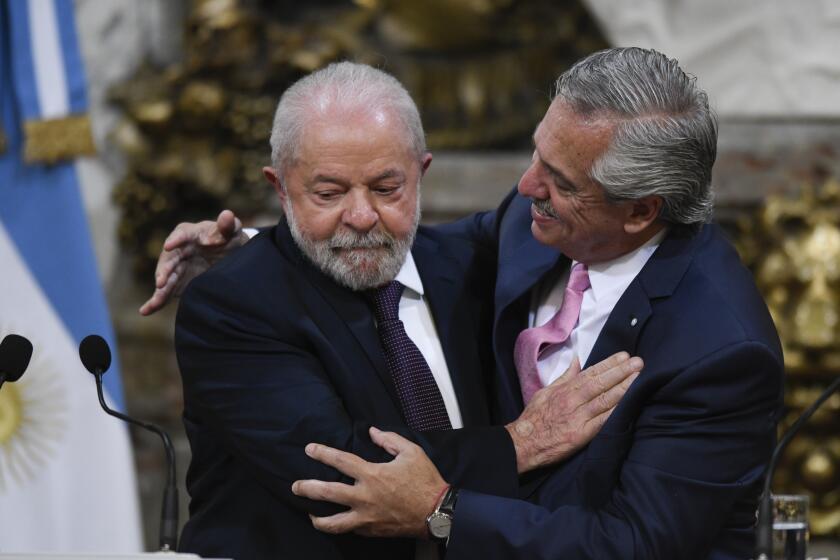Right-wing populist Milei set to take Argentina down uncharted path after winning power

- Share via
BUENOS AIRES — What many deemed impossible just months ago is reality: Right-wing populist Javier Milei resoundingly won Argentina’s presidency.
His victory Sunday night has thrust the country into the unknown regarding just how extreme the fiery freshman lawmaker’s policies will be, following a campaign that saw him revving a chainsaw to symbolically cut the state down to size.
With almost all votes tallied, Milei handily beat Economy Minister Sergio Massa, 55.7% to 44.3%. Milei won all but three of the nation’s 24 provinces, and Massa had conceded even before the electoral authority began announcing preliminary results.
Milei started to outline the broad strokes of his upcoming administration Monday morning and said he would travel to the U.S. and Israel before taking office Dec. 10
Milei, 53, a self-described anarcho-capitalist with a disheveled mop of hair, made his name by furiously denouncing the “political caste” on television programs. His pledge for abrupt, severe change resonated with Argentines weary of annual inflation soaring above 140% and a poverty rate that reached 40%.
Once in office, he has said, he will slash government spending, dollarize the economy and eliminate the Central Bank as well as key ministries, including those of health and education. An admirer of former President Trump, he has likewise presented himself as a crusader against the sinister creep of global socialism, with plans to purge the government of corrupt establishment politicians. In the weeks before the runoff, though, he walked back some of his more unpopular proposals, such as loosening gun controls and sweeping, indiscriminate privatization.
Millions of Argentines are struggling to make ends meet as their country’s annual inflation rate clocked in at a staggering 102.5% in February.
“Hang on to your hat,” said Benjamin Gedan, director of the Latin America Program at the Washington-based Wilson Center. “Milei has toned down his anti-establishment rage lately and downplayed his more outlandish proposals, but it’s going to be a wild ride, given his combative style, inexperience and the few allies he has in Congress.”
Milei said in a radio interview he would soon travel to the United States in a trip that has more of a “spiritual connotation” and involves visiting rabbis that he’s close to in Miami and New York. He said he would travel to Israel from New York.
“We were talking about it yesterday with the ambassador of Israel in Argentina,” Milei said.
Milei, who has long said he was considering converting to Judaism, has often emphasized his support for Israel and frequently waved an Israeli flag in his rallies. He had previously said he wanted to move Argentina’s embassy in Israel from Tel Aviv to Jerusalem, following in Trump’s footsteps.
A judge in Argentina has dismissed a long-running money laundering case against Vice President Cristina Fernández de Kirchner.
Supporters celebrated Sunday night outside Milei’s headquarters in downtown Buenos Aires, drinking beer and chanting as fireworks went off overhead. They waved both Argentine flags and the yellow Gadsden flag, emblazoned with the words “Don’t Tread on Me,” which Milei’s movement has adopted.
“We no longer want the past; we are betting on the future,” said Ezequiel Fanelli, 45, who works for an insurance company and had a Gadsden flag in hand.
“We believe it’s a change. Clearly, it’s not easy; it’s doesn’t happen overnight. It’s a collective construction, not just his alone,” Fanelli added.
By wresting power from Massa’s Peronist party, which has dominated Argentine politics for decades, Milei’s victory represents a political paradigm shift in the country. He is the first outsider to reach the presidency and considerably farther right than anyone who has held the position before.
Market analysts are reacting with deep skepticism to a proposal floated by the leaders of Brazil and Argentina to launch a common currency.
“I have a lot of faith in the policies that he can push forward, and I hope he can fulfill everything he proposed without obstacles in the middle,” said Ayalen Abalos, a 22-year-old tourism student.
Indeed, implementing his agenda will be one of the main challenges, analysts say.
“Milei and his hardcore supporters will see his decisive victory as a mandate for radical change and an endorsement of his conservatism. That would be a mistake,” Gedan said. “Many Argentines voted for him reluctantly, unwilling to support the economy minister of a collapsed economy.”
And while the broad margin of victory reflects support from the people, he will need political allies as well, said Mariel Fornoni of the political consulting firm Management & Fit. Milei’s fledgling Liberty Advances party, for example, has zero governors.
News Alerts
Get breaking news, investigations, analysis and more signature journalism from the Los Angeles Times in your inbox.
You may occasionally receive promotional content from the Los Angeles Times.
“Without political support, he won’t be able to do what he said he was going to do,” said Fornoni. Complicating his challenge further, Milei “has had little prior leadership experience — he has never led a legislative chamber, a province, or a company.”
But the way in which voters proved willing to hand the country’s reins to someone untested lays bare the deep discontent Argentines harbor for the ruling class and the status quo. It marks the culmination of an improbable rise to power. Milei parlayed his television stardom into a seat in Argentina’s lower house of Congress two years ago. Just months ago, his presidential bid was viewed as a mere sideshow — until he scored the most votes in August primary elections and sent shock waves through the political landscape.
Milei, a libertarian economist, focused much of his campaign on economic proposals, casting blame on successive administrations for printing money with abandon to fund state spending. Ahead of the first round, Milei sometimes carried a chainsaw at rallies, a symbol of his intention to cut state spending.
In the run-up to the vote, Massa and his allies had cautioned Argentines that his opponent’s plan to eliminate key ministries and otherwise sharply curtail the state would threaten public services, including health and education, and welfare programs many rely on. Milei accused his opponent of running a “campaign of fear” and, in his final campaign spot, stared starkly into the camera and promised he would not privatize education, healthcare or soccer clubs.
Thousands of fans lined up in the wee hours to try to get a glimpse of Argentina’s victorious World Cup soccer team on its return from Qatar.
The wide margin of Milei’s victory suggests that voters agreed the hype was overblown and were turned off, said Andrei Roman, CEO of Brazil-based pollster Atlas Intel, one of the only pollsters to correctly call the election’s first round. There was a virtual tie in the province of Buenos Aires, home to almost 37% of the national electorate and a key bastion of Peronism. Massa kicked his party’s machine into overdrive there to bring in votes — but to little avail, representing “the total defeat of Peronism,” Roman said.
“Massa’s campaign pushed the strategy of fear regarding Milei a lot and I think it backfired,” he said, highlighting a Massa ad that showed a young child picking up a stray gun and shooting his friend. Such issues are hardly people’s primary concerns, so they see it as “just foul play and a cheap, unconvincing strategy.”
Some of Milei’s positions appear to echo those of more conservative Republicans in the U.S.: He opposes sex education, feminist policies and abortion, which is legal in Argentina, and rejects the notion that humans have a role in causing climate change.
His fiery, profanity-laden rhetoric has already inserted the country into the global culture war that has overwhelmed political discourse in the U.S. and Brazil. Like Trump and former Brazilian President Jair Bolsonaro, Milei had made unfounded claims of election fraud before Sunday’s runoff, which many analysts said raised concern about him eroding democratic norms.
Milei’s rise also means the rise of Victoria Villaruel, his controversial running mate, who has worked for years to change the prevailing narrative regarding Argentina’s brutal 1976-1983 dictatorship. She has long said that the number of victims from that bloody period is far below what human rights organizations have claimed, among other controversial positions.
“Despite Milei, despite all his campaign mistakes, despite all his peculiarities that raise doubts, concerns … despite all of that, the demand for change prevailed,” said Lucas Romero, the head of Synopsis, a local political consulting firm.
More to Read
Sign up for Essential California
The most important California stories and recommendations in your inbox every morning.
You may occasionally receive promotional content from the Los Angeles Times.














